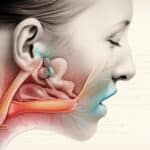Is My Ear Ringing? Decoding Tinnitus and How to Find Relief
- Get link
- X
- Other Apps
Introduction
Ever experienced a persistent ringing in your ears and wondered, “Why is my ear ringing?” If so, you’re not alone. Millions worldwide grapple with this puzzling phenomenon, formally known as tinnitus. This article delves into the reasons behind this often-maddening condition, the varied forms it can take, and the tell-tale symptoms to look out for. So let’s take this journey of understanding together, giving you a road map to better comprehend what’s happening when your ears are ringing.
Why Is My Ear Ringing?: An Overview
Ear ringing, medically referred to as tinnitus, represents more of a symptom than a condition in itself. Perhaps you’ve noticed it following a loud concert or a sudden loud noise. However, if such an auditory sensation persists, or you find your ear ringing all day, this could be indicative of an underlying condition. Indeed, tinnitus often serves as a warning flare highlighting some degree of auditory malfunction.
What Causes Ear Tinnitus?
As explained in this comprehensive post about the causes of ear tinnitus on our site, various underlying conditions can trigger tinnitus. Anything from impacted ear wax, age-related hearing loss, and ear infections, to exposure to loud noises can lead to ear ringing. Another potential culprit is Meniere’s disease, a disorder of the inner ear characterized by dizziness, hearing loss, and, of course, tinnitus. To navigate this complex cause-treatment matrix, it’s essential to understand that ear ringing isn’t the disease but rather a symptom of something bigger.
Link Between Constant Ear Ringing and Tinnitus
So, is your constant ear ringing tinnitus? As elucidated in our blog post, the line between occasional and persistent ear ringing can blur. In essence, if the ringing is frequent or persistent enough to affect your quality of life, you likely have tinnitus. The condition can manifest variously, from a low roar or high-pitched buzz to a continuous or intermittent ringing sound. Interestingly, some people experience tinnitus in just one ear while others hear the noise in both.
Different Forms and Symptoms of Ear Ringing
Interestingly, tinnitus isn’t a one-size-fits-all condition. It presents itself in various forms and intensities – it might be light tinnitus barely noticeable above the ambient noise or a severe, constant ear ringing that disrupts your daily life. The sheer multifaceted nature of this condition warrants a closer look to help individuals identify their symptoms. Hence, let’s delve into the different faces of ear ringing, from persistent to intermittent, and from barely-there to severely disruptive.
What Does Tinnitus Sound Like?
One of the first questions that comes to mind when you start hearing unnerving noises in your ears is, “What is causing my ear to ring?” Understanding the distinctive sounds associated with tinnitus can help us make sense of this condition. Although it’s often described as ringing, you may also hear hissing, buzzing, or even a roaring sound, akin to wind or rushing water. The sound may vary in pitch from a low roar to a high squeal, and you may hear it in one or both ears. At times, the sound can be so loud that it interferes with your ability to concentrate or hear external sounds. In my blog post “What Tinnitus Sounds Like”, we discuss these sounds in a more detailed and cohesive manner.
Is My Ear Ringing a Sign of Something Serious?
Tinnitus isn’t a condition itself — it’s a symptom of an underlying condition, such as age-related hearing loss, ear injury, or a circulatory system disorder. Sometimes the perceived noise is so persistent or intrusive that it can cause fatigue, depression, anxiety, and problems with memory and concentration. However, for most people, tinnitus isn’t a sign of something serious. Although it can worsen with age, for many people, tinnitus can improve with treatment. This shows how crucial it is to understand the different types of tinnitus and their link to other health issues.
The Impact of Tinnitus on Daily Life and Sleep
There’s no doubt that when your ears are buzzing like a swarm of bees, it can significantly impact your daily activities and sleep quality. Some days, you may be able to ‘tune out’ the tinnitus sound; on others, it may be a constant distraction causing fatigue and distress. How you cope can depend on how severe your tinnitus is and how much it impacts your life. But let’s break this down further.
Dealing with Persistent Ear Ringing at Night
Most people with tinnitus report that their symptoms are most bothersome when there is little or no background sound, like at night when trying to sleep. Why is this the case? Well, in the absence of environmental noises, the tinnitus sound becomes more prevalent, turning into a tormenting symphony that keeps you up at night. However, there are various strategies available for dealing with persistent ear ringing at night. These can range from masking the tinnitus sound with white noise generators to medications that can help you sleep better. Check out my blog post on “How to Deal with Persistent Ear Ringing at Night” for a more detailed walkthrough on managing tinnitus during quieter hours.
When Tinnitus Comes and Goes
Now, you might be wondering, “Why does my tinnitus seem to fluctuate?” Is it just your perception, or does the condition indeed wax and wane? My blog post on why tinnitus comes and goes explains this in detail. Simply put, fluctuations in tinnitus symptoms can be particularly maddening. At one moment, you might be enjoying the bliss of silence, only to have it disrupted by an abrupt onset of ear ringing. Unfortunately, the explanation for this isn’t very straightforward—cumulative noise exposure, stress, certain foods, lack of sleep, and even hormonal changes can trigger tinnitus or exacerbate underlying symptoms. By keeping track of your environmental and lifestyle variables, you might be able to identify potential catalysts for your fluctuating ear ringing.
How to Manage and Treat Tinnitus
Now that you have a better grasp of what exactly is happening when your ears are buzzing, it is about time to get equipped with the right tools to manage and treat tinnitus. Rest assured, once you have identified the underlying cause of your tinnitus — be it through a health checkup, hearing test, or even a regular doctor’s appointment — there is a multitude of both medical and home remedies at your disposal. From sound therapy and Cognitive Behavioral Therapy (CBT) to hearing aids and even simple dietary changes, tinnitus management is all about equipping yourself with the right strategies and tools to minimize the condition’s impact on your everyday life.
Does Tinnitus Go Away on Its Own?
The prognosis of tinnitus can vary significantly from person to person. While some individuals might find their symptoms subsiding as spontaneously as they came, others might need more active intervention or even learn to live with the condition. An important thing to note, as highlighted in this post on whether tinnitus goes away on its own, is that the body’s natural ability to “tune out” the tinnitus noise — a process known as habituation — is a key element in spontaneous recovery. That said, it’s crucial that you don’t bank on your symptoms disappearing by themselves. Seek medical help, explore treatments, and remember — proactive management is your best bet in the fight against tinnitus.
When Should I Worry About Persistent Ear Ringing?
And finally, a fundamental question — when is it time to seek medical advice for persistent ringings in your ears? The rule of thumb, as discussed in more detail in our blog post “When Should I Worry About Tinnitus?” is to seek help if your tinnitus is persistent, unilateral (only in one ear), or accompanied by sudden hearing loss, dizziness, or changes in your balance. While tinnitus is often not a sign of a serious medical disorder, it can significantly impact the quality of life for those struggling with the condition. With the right medical guidance, however, you can learn to manage your symptoms and thereby lessen tinnitus’s impact on your day-to-day life.
Keep in mind that tinnitus is a complex condition, and no two individuals will experience it the same way. However, the shared experiences and advice found throughout the pulsatile tinnitus community can provide useful insights and coping strategies. Nourish yourself with the knowledge readily available on pulsatiletinnitustreatments.com, and remember — understanding your tinnitus is the first step toward successfully managing it.
Best Doctor for Tinnitus
When struck with persistent ear ringing, you may feel challenged to pinpoint exactly who to seek help from. The realm of medical practitioners is as vast as the ocean, and occasionally, just as overwhelming. Which professional is the most equipped to help you navigate your tinnitus journey? Ear, nose, and throat specialists (ENTs) are the primary doctors who deal with tinnitus at the front. They can conduct a series of tests to determine the cause and rule out any severe underlying condition such as an ear infection or a benign tumor. An audiologist is another crucial player in this field, specializing in diagnosing and treating hearing disorders, including tinnitus. In certain complex cases, you might even need to visit a neurologist or a cardiovascular specialist. If you’d like to dive deeper into exploring the healthcare professionals best suited for your tinnitus, head over to this comprehensive blog post “Best Doctor for Tinnitus” published on our website.
Conclusion
No journey is too grueling when adequately equipped, and the same applies to your tinnitus journey. Amid the noise—literal and figurative—you can find a semblance of peace. After all, tinnitus doesn’t spell a nefarious disease but rather, a symptom—a prompt to seek help to etch out a better quality of life. Don’t forget that the key takeaway here is: that you’re not alone in this. Reach out, seek help, educate yourself, and remember, every bit of the effort is for the one person who counts the most—You. Remember to visit “Understanding Tinnitus” on our website for a comprehensive guide. May you navigate through the noise and embrace the quiet. Your journey towards better hearing begins today.
Is My Ear Ringing - Frequently Asked Questions (FAQ)
Ringing in your ear, scientifically known as tinnitus, can be caused due to various reasons. This includes exposure to loud noise, age-related hearing loss, ear wax blockage, changes in the bones of the ear, or even medications. Stress and depression can also exacerbate the symptoms of tinnitus.
While tinnitus or ear ringing is generally not a sign of a serious medical problem, it can significantly impact your quality of life, causing stress, anxiety, and sleep problems. It also can be a symptom of a more serious health condition such as Meniere’s disease. Seek professional help if your tinnitus persists.
In many cases, tinnitus subsides on its own without any treatment. However, if tinnitus is due to an underlying health condition, the condition may need to be treated for the tinnitus to improve. If your tinnitus continues for more than a couple of weeks or negatively impacts your quality of life, seek medical attention.
Yes, there are treatments available to help manage ear ringing or tinnitus. Treatment options include various therapies such as sound therapy, cognitive behavioral therapy, tinnitus retraining therapy, or even hearing aids. Therapy for tinnitus is usually aimed at managing the condition and improving your quality of life.
People with tinnitus often explain the condition as a ringing in the ears, but others describe it as a buzzing, hissing, or roaring sound. The noise can vary in pitch from a low roar to a high squeal, and you may hear it in either one ear or both. For some people, the noise can be so loud it interferes with their ability to concentrate or hear actual sound.
The post Is My Ear Ringing? Decoding Tinnitus and How to Find Relief appeared first on Pulsatile Tinnitus Treatments News - Tinnitus Relief.
Related posts:
https://ift.tt/Svzxo7U
#tinnitus #pusatiletinnitus #earringing #whatistinnitus #howtostoptinnitus
- Get link
- X
- Other Apps



Comments
Post a Comment